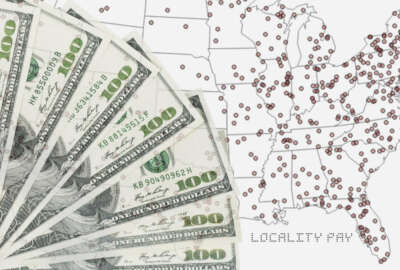
Trump aiming for late-September launch of payroll tax deferral for federal employees
All federal providers are working to implement the payroll tax deferral policy President Donald Trump announced earlier this month in an executive order, the...
Best listening experience is on Chrome, Firefox or Safari. Subscribe to Federal Drive’s daily audio interviews on Apple Podcasts or PodcastOne.
Payroll providers are preparing to implement the president’s payroll tax deferral policy for federal employees, though many questions remain about the plan and its potential impact on the workforce.
The changes stem from an executive order President Donald Trump signed back on Aug. 8, which allows employers to defer withholding and payment of a portion of their employees’ Social Security taxes if wages are under a certain threshold.
“The federal government will implement an across-the-board payroll tax deferral by all federal payroll providers, so all federal employees who meet the income threshold will see savings,” a senior administration official told Federal News Network Monday in an email. “We want all payroll providers to implement the deferral on the same schedule, so the deferral should be implemented starting with the second paycheck in September.”
For most federal employees, the second paycheck of the month falls somewhere between Sept. 18 and 24, depending on the payroll provider.
Most employers didn’t have instructions on how to implement this order until late last Friday, when the IRS issued guidance on the topic.
But the Agriculture Department’s National Finance Center first informed customers of its plans to implement the president’s EO on Aug. 21.
The payroll provider said it planned to eliminate the Old Age, Survivors and Disability Insurance (OASDI) deductions for employees whose gross Social Security wages are less than $3,999.99.
“We will continue to calculate and remit the employer portion of OASDI,” the notice said. “With that being said, the elimination of the withholding will vary by employee by [payroll period], based upon any changes in their gross social security wages.”
Though federal employees would see savings next month and through December of this year, the payroll tax break is temporary. Federal employees have from January through April 2021 to pay deferred payroll taxes back before interest or other penalties accrue next May, the IRS said.
The National Finance Center’s Aug. 21 memo hinted at the obligation to pay the deferred taxes back, though it suggested Congress could eliminate the requirement through separate legislation, a prospect many believe is unlikely.
Employees in the Civil Service Retirement System (CSRS) will not be impacted, because they don’t usually withhold Social Security taxes.
Federal employees who, for example, earn salaries that would usually come in under the $4,000 threshold but are working more hours during the coronavirus pandemic and temporarily exceed the gross income limit would have payroll tax deductions withheld from their salaries, NFC said.
The National Treasury Employees Union, which as of Friday was still collecting information on the administration’s plans to defer payroll taxes, said federal workers should have the opportunity to opt out of the president’s temporary payroll tax holiday.
“As we await guidance from the administration about how the payroll tax suspension may be implemented for federal employees, we urge Treasury officials to give employees ample time and clear instructions about how this will affect their paychecks and — even more importantly — next year’s tax bill,” Tony Reardon, NTEU’s national president, said Friday in a statement. “If the government does not provide a clear and complete explanation that the tax withholding is only temporarily paused and must, ultimately, be fully paid, we fear that too many employees will be unprepared for the higher tax obligation in 2021.”
The Office of Management and Budget, which was handling media requests on the president’s payroll tax deferral for the federal workforce, didn’t respond to a question about whether employees would be able to opt out.
Timing of the payroll tax deferral is another question.
With a planned implementation for mid-to-late September, launching a temporary payroll tax break in less than two months — Trump signed the executive order to defer Social Security deductions on Aug. 8 — is a quick timeline, especially considering how long the federal providers have taken to carry out other complex changes.
For example, it took payroll providers several months last year to implement the 2019 retroactive pay raises for federal employees. And some agencies had difficulty making emergency paid sick leave available to their employees during the coronavirus pandemic, again, because providers had to code and program the changes into their timekeeping and payroll systems.
According to the first NFC memo, the payroll provider was making system modifications to prepare for implementation on the first pay period in September, on or around Sept. 8.
But by late last Friday afternoon, the NFC pulled back on those plans, stating it would await final guidance from the Treasury Department and Office of Personnel Management.
Employee unions and at least one member of Congress are skeptical of the payroll tax deferral plans for the federal workforce.
“The Trump administration’s plan to initiate payroll tax deferrals for civil servants treats the federal workforce as a guinea pig for a bad policy that businesses already rejected as ‘unworkable,’” Rep. Don Beyer (D-Va.) said in a statement Friday. “This payroll tax deferral does not really put money in workers’ pockets, it simply sets up the members of the federal workforce who can least afford it for a big tax bill that many will not expect.”
The National Federation of Federal Employees said the policy would have long-term impacts on workers.
“Either way, the employee loses,” Randy Erwin, NFFE national president, said Monday in a statement. “If the tax deferment becomes permanent, and provided it is legal, the employee could get a lower payout in retirement. If the deferment is temporary, the employee risks getting a huge tax bill plus interest and penalties early next year.”
The American Federation of Government Employees took its criticism a step further, describing the president’s payroll tax deferral as a way to undermine and bankrupt Social Security.
Rather than deferring Social Security payroll taxes, Erwin said the administration should instead give federal employees a larger pay raise. The president is planning on a 1% federal pay raise for civilian employees in 2021, though some members of Congress and unions have advocated for a 3% bump instead.
Military members are on track to receive a 3% pay raise next year.
Copyright © 2025 Federal News Network. All rights reserved. This website is not intended for users located within the European Economic Area.
Nicole Ogrysko is a reporter for Federal News Network focusing on the federal workforce and federal pay and benefits.
Follow @nogryskoWFED





